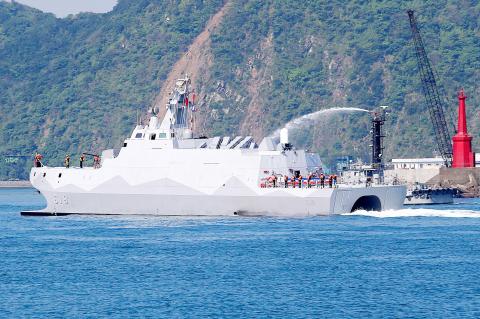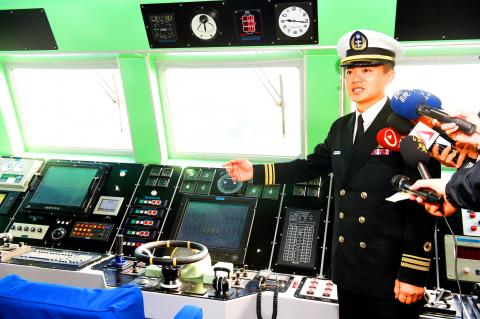The nation’s new stealth missile corvette, the Tuo Jiang (沱江), began its service yesterday.
Minister of National Defense Yen Ming (嚴明) presided over the ship commissioning ceremony at Suao Port in Yilan County.
The 500-tonne corvette was handed over by its builder Lung Teh Shipbuilding Co to the Republic of China Navy yesterday morning after undergoing performance testing and sea trials in recent weeks.

Photo: CNA
Yen touted the newly commissioned vessel as “currently the fastest warship in Asia and possessing the most firepower.”
“The ship’s commissioning today marks a milestone in the Republic of China Navy’s efforts to enhance its combat capabilities and modernize its fleet,” he said.
Yen said the program is a model of success for the military’s domestic warship-building policy, since the Tuo Jiang is a wholly indigenous production, from its concept and design to its manufacturing.

Photo: Chien Jung-Fong, Taipei Times
The ship’s captain, Lieutenant Commander Wang Te-jean (王得?), affirmed the corvette’s reputation as a first-rate littoral combat warship.
“It is the navy’s aircraft-carrier killer. With speed, good mobility and stealth technology, the corvette can get close to its target before launching a missile attack,” Wang said.
The vessel can carry 16 Hsiung Feng II and Hsiung Feng III anti-ship supersonic missiles.
According to its original design, the corvette has a maximum speed of 38 knots (70.4kph), but it was able to reach 44 knots during the sea trials, Wang said.
Its advanced electronics system allows the captain to direct the vessel without having to remain on the bridge, he added.
The corvette is outfitted with an Otobreda 76mm gun, four 12.7mm machine guns, an MK15 Phalanx close-in weapons system and three MK32 torpedo launchers each on the port side and the starboard sides.
The Tuo Jiang has a twin-hulled catamaran design with a combination of tilted angles and flat surfaces to give it a low observation profile, along with the use of radar-absorbent materials with other advanced stealth technologies to reduce its visibility to radar detection and tracking.
“It has two MTU V16 diesel engines that power a water-jet propulsion system, which enables the ship to sprint high in the water at high velocities, even in rough conditions,” navy spokesman Vice Admiral Wen Cheng-kuo (聞振國) said, adding that it has a range of 2,000 nautical miles (3,704km).
Following the handover, the navy is to begin training personnel to familiarize them with the craft, which is based at the port in Suao Township (蘇澳).
The vessel cost about NT$2.1 billion (US$66.39 million), and the navy has plans to commission eight to 12 of the corvettes, depending on budget funding.
Lung Teh began construction of the Tuo Jiang in late 2012.
Huang lauded the navy’s efforts to work with local shipbuilding companies.
In a symbolic gesture, Lung Teh chairman Huang Shou-chen (黃守真) handed over a miniature model of the corvette to Yen.
The 60.4m-long, 14m-wide vessel is patterned after Independence-class LCS (littoral combat ships) produced by the US that are designed to operate mostly in coastal zones.
Additional reporting by CNA

Chinese Nationalist Party (KMT) Chairman Eric Chu (朱立倫), spokeswoman Yang Chih-yu (楊智伃) and Legislator Hsieh Lung-chieh (謝龍介) would be summoned by police for questioning for leading an illegal assembly on Thursday evening last week, Minister of the Interior Liu Shyh-fang (劉世芳) said today. The three KMT officials led an assembly outside the Taipei City Prosecutors’ Office, a restricted area where public assembly is not allowed, protesting the questioning of several KMT staff and searches of KMT headquarters and offices in a recall petition forgery case. Chu, Yang and Hsieh are all suspected of contravening the Assembly and Parade Act (集會遊行法) by holding

PRAISE: Japanese visitor Takashi Kubota said the Taiwanese temple architecture images showcased in the AI Art Gallery were the most impressive displays he saw Taiwan does not have an official pavilion at the World Expo in Osaka, Japan, because of its diplomatic predicament, but the government-backed Tech World pavilion is drawing interest with its unique recreations of works by Taiwanese artists. The pavilion features an artificial intelligence (AI)-based art gallery showcasing works of famous Taiwanese artists from the Japanese colonial period using innovative technologies. Among its main simulated displays are Eastern gouache paintings by Chen Chin (陳進), Lin Yu-shan (林玉山) and Kuo Hsueh-hu (郭雪湖), who were the three young Taiwanese painters selected for the East Asian Painting exhibition in 1927. Gouache is a water-based

Taiwan would welcome the return of Honduras as a diplomatic ally if its next president decides to make such a move, Minister of Foreign Affairs Lin Chia-lung (林佳龍) said yesterday. “Of course, we would welcome Honduras if they want to restore diplomatic ties with Taiwan after their elections,” Lin said at a meeting of the legislature’s Foreign Affairs and National Defense Committee, when asked to comment on statements made by two of the three Honduran presidential candidates during the presidential campaign in the Central American country. Taiwan is paying close attention to the region as a whole in the wake of a

OFF-TARGET: More than 30,000 participants were expected to take part in the Games next month, but only 6,550 foreign and 19,400 Taiwanese athletes have registered Taipei city councilors yesterday blasted the organizers of next month’s World Masters Games over sudden timetable and venue changes, which they said have caused thousands of participants to back out of the international sporting event, among other organizational issues. They also cited visa delays and political interference by China as reasons many foreign athletes are requesting refunds for the event, to be held from May 17 to 30. Jointly organized by the Taipei and New Taipei City governments, the games have been rocked by numerous controversies since preparations began in 2020. Taipei City Councilor Lin Yen-feng (林延鳳) said yesterday that new measures by